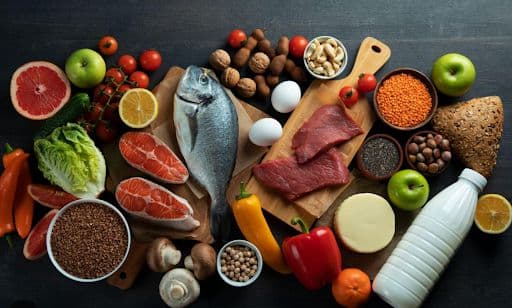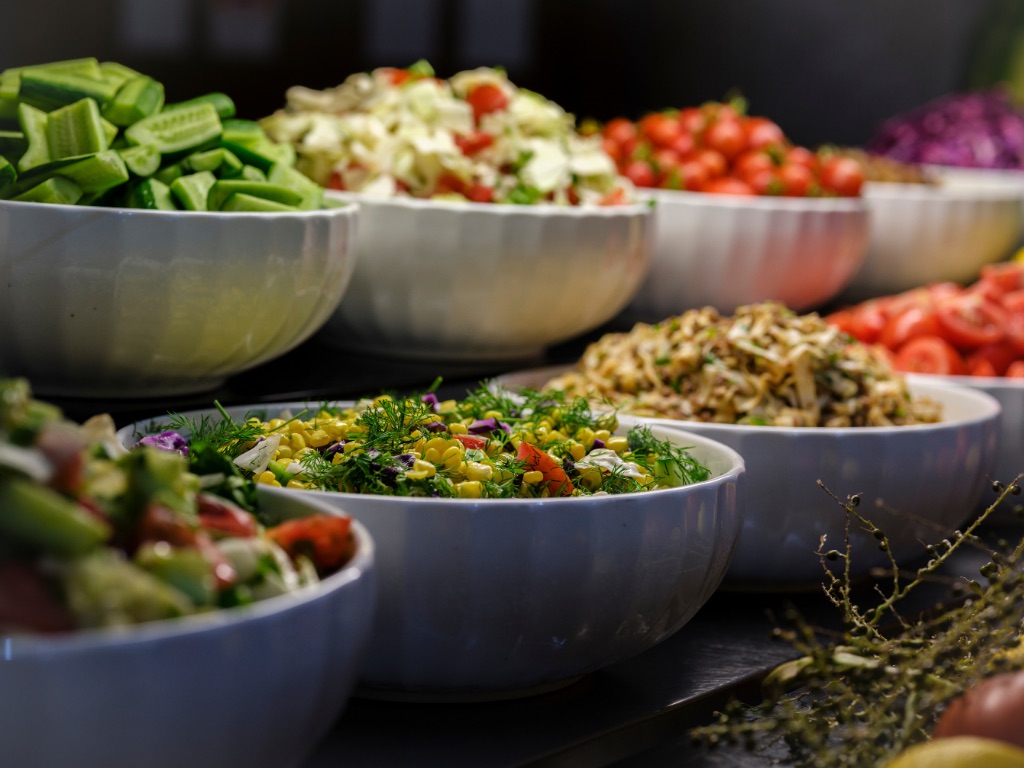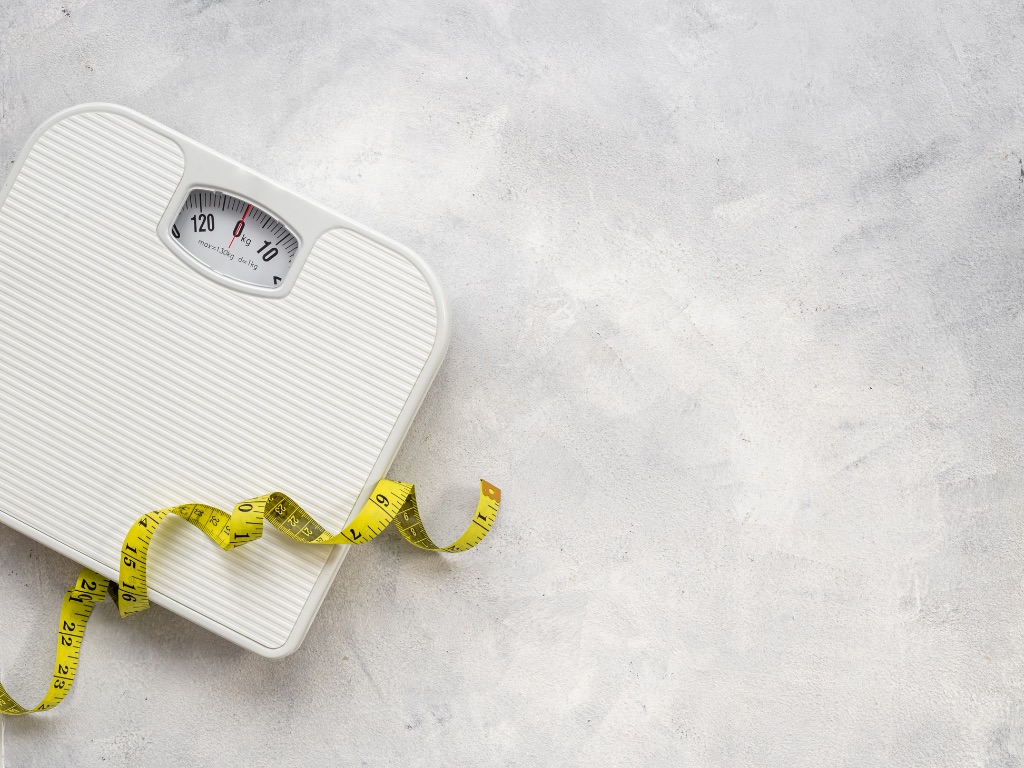Testosterone is more than just a “male hormone.” It plays a key role in energy levels, muscle strength, mood stability, and sexual health for both men and women. Low testosterone can leave you feeling fatigued, affect your confidence, and even disrupt metabolism1. The good news is that your diet can make a big difference.
By adding the right nutrient-rich foods to your meals, you can naturally support hormone production and keep your body in balance. In this blog, we’ll explore the 9 best foods scientifically linked to boosting testosterone levels, and how you can easily include them in your daily routine.
How Foods Influence Testosterone Production.
The food you eat directly affects how much testosterone your body produces. Testosterone synthesis depends on key nutrients such as zinc, magnesium, vitamin D, and vitamin E, along with healthy fats and antioxidants. These compounds fuel hormone production, protect cells from damage, and ensure your endocrine system functions smoothly2.
Vitamins & Minerals: Zinc (found in oysters, beef, and nuts) and magnesium (found in spinach and seeds) are critical for maintaining testosterone levels. Vitamin D also plays a vital role, as deficiencies often link to low testosterone.
Healthy Fats: Monounsaturated and omega-3 fats (in avocados, salmon, and nuts) help your body build hormones since testosterone is derived from cholesterol.
Antioxidants: Foods like pomegranate and garlic protect Leydig cells in the testes, where testosterone is produced, from oxidative stress.
Symptoms of Low Testosterone Levels
Recognizing the signs of low testosterone3 is crucial because diet alone may not be enough if levels are severely depleted. Common symptoms include:
Reduced sex drive and erectile dysfunction.
Fatigue and low energy throughout the day.
Loss of muscle mass and increased body fat.
Mood swings, irritability, or depression.
Difficulty concentrating and poor memory.
Thinning hair and reduced bone density.
A diet rich in testosterone-boosting foods, combined with exercise, sleep, and stress management, can help reverse many of these issues naturally. Let’s deeply understand what the 10 Best Testosterone-Boosting Foods are.
The 10 Best Testosterone-Boosting Foods.
1. Oysters: The Ultimate Testosterone Superfood.
Oysters are incredibly rich in zinc, providing far above the daily requirement, approximately 673% of RDA4 in just a few oysters. Zinc is critical for testosterone synthesis and reproductive function; deficiency can impair hormone production. Multiple studies5 also reveal that oyster peptides possess strong antioxidant properties and may stimulate testosterone secretion and sexual function. Plus, oysters’ omega-3s may boost blood flow and support sexual health.
2. Ginger: Spicing Up Testosterone Levels
Ginger has shown promise in preclinical models6 for enhancing testosterone. It works by increasing luteinizing hormone (LH), improving testicular blood flow, reducing oxidative stress, and supporting antioxidant defenses.
3. Eggs: The Hormone-Building Breakfast Staple
Eggs8 offer a solid combination of protein, healthy fats, cholesterol, and vitamin D, vital building blocks for testosterone synthesis. Their selenium content may also contribute to hormone health, as studies suggest selenium can enhance testosterone production.
4. Pomegranate: The King of Antioxidants
Pomegranate juice has been shown to raise salivary testosterone9 levels by around 24% after just 1–2 weeks of daily intake, and also improve mood and reduce blood pressure. Its polyphenols combat oxidative stress, protecting endocrine health10 and potentially supporting testosterone production.
5. Lean Beef: Protein Meets Vitamin D
Lean beef is a potent source of both protein and zinc, both essential for testosterone and reproductive health. It may also provide vitamin D, further supporting hormone function and endocrine balance.
A study of 206 young men11 in Spain (Maldonado-Cárceles et al., 2019, British Journal of Nutrition) found that while total meat intake was not directly linked to testosterone, certain types of meat had clear reproductive effects. Nutritionally, a 100-gram serving of lean beef provides around:
4.8 mg of zinc (44% of daily value),
2.1 mcg of vitamin D (about 10% of daily value),
~26 g of protein, crucial for muscle growth and testosterone balance.
Together, these nutrients make beef a testosterone-friendly protein when consumed in moderation and paired with a balanced diet.
6. Avocados: The Healthy Fat Hero
Avocados pack monounsaturated fats, magnesium, and a notable amount of the trace mineral boron12, which may influence testosterone metabolism13 and reduce its degradation. Boron supplementation has been linked to increases in free testosterone in humans and animal studies.
Recent 2023 research14 reveals that avocados have significant effects on hormonal physiology, particularly improving insulin sensitivity and promoting post-meal satiety. The fruit demonstrates notable reproductive impacts, with studies showing fertility-enhancing effects in men through positive influences on testosterone, luteinizing hormone (LH), and follicle-stimulating hormone (FSH) levels. Research7 also suggests that boron may reduce inflammation and influence how the body metabolizes hormones.
7. Nuts: Tiny Powerhouses of Testosterone Fuel
Nuts are excellent sources of zinc, healthy fats, and other minerals, all vital for hormone production and gonadal health. According to a clinical review15, nuts contain high nutrient density, which makes them a convenient addition to boost testosterone naturally.
8. Spinach: The Muscle-Builder’s Green
Spinach and other dark leafy greens supply magnesium, which supports testosterone by reducing oxidative stress and aiding hormone synthesis. A clinical study16 conducted in 2017 found that spinach extract significantly restored male reproductive health. Obesity reduced testosterone levels and damaged testicular tissue, but four weeks of spinach treatment normalized testosterone and repaired testicular structure. This research suggests spinach's antioxidants can counteract obesity-induced reproductive dysfunction in males.
9. Garlic: The Ancient Testosterone Booster.
Garlic is rich in antioxidants and has been shown in animal studies to raise LH levels, which in turn enhances testosterone synthesis. While human data is limited, its cellular benefits make garlic a worthwhile inclusion.
A Nigerian study17 showed that aqueous garlic extract (200 mg/kg) significantly boosted testosterone levels and testicular weight in rats, with longer treatment producing greater benefits. The research revealed preserved sperm-producing cells and healthy testicular tissue, attributing these fertility-enhancing effects to garlic's zinc and selenium content, which supports hormone production.
Lifestyle Hacks That Multiply The Effects of Foods.
A diet of avocados, spinach, and garlic, combined with lifestyle adjustments, can optimize testosterone and fertility by improving nutrient absorption, hormone production, and cellular repair.
Resistance Training: Heavy compound exercises like squats, deadlifts, and bench presses trigger acute testosterone spikes and improve long-term hormonal balance, while also increasing nutrient uptake in muscle tissue.
Quality Sleep (7-9 hours): Testosterone production peaks during deep sleep phases, and poor sleep can reduce T-levels by up to 15% - prioritize consistent sleep schedules and dark, cool environments.
Stress Management: Chronic stress elevates cortisol, which directly suppresses testosterone production - practice meditation, deep breathing, or yoga to maintain optimal hormonal ratios.
Intermittent Fasting: Short fasting windows (12-16 hours) can boost growth hormone and improve insulin sensitivity, enhancing the metabolic benefits of fertility-supporting foods.
Cold Exposure: Brief cold showers or ice baths may stimulate testosterone production and improve circulation to reproductive organs.
Sunlight/Vitamin D: Morning sunlight exposure supports circadian rhythm regulation and vitamin D synthesis, both crucial for testosterone production.
Minimize Alcohol: Limiting alcohol intake preserves liver function and prevents the conversion of testosterone to estrogen.
FAQS
Can low testosterone be treated with diet alone?
In mild cases, diet and lifestyle changes, like adding zinc-rich foods, exercising, and getting enough sleep, can help restore testosterone levels. However, severely low testosterone may require medical evaluation and treatment.
Which fruits are best for testosterone?
Pomegranate is one of the top fruits for testosterone support. It has strong antioxidant properties, and research shows it can raise salivary testosterone by up to 24%.
What are the symptoms of low testosterone in men?
Signs include low sex drive, fatigue, mood swings, muscle loss, weight gain, difficulty concentrating, and thinning hair. Recognizing these early helps in taking preventive steps.
How can I naturally boost testosterone fast?
Combine a diet rich in oysters, salmon, nuts, spinach, and garlic with resistance training, quality sleep, stress management, and sunlight exposure for the fastest results.
References
1-Saad F, Gooren LJG. The role of testosterone in the metabolic syndrome: A review. J Steroid Biochem Mol Biol. 2009 Mar;114(1-2):40–43. doi: 10.1016/j.jsbmb.2008.12.022.
2- Rojas-Zambrano JG, Rojas-Zambrano AR, Rojas-Zambrano AF, Barahona-Cueva GE. Benefits of Testosterone Hormone in the Human Body: A Systematic Review. Cureus. 2025 Feb;17(2):e78785. DOI: 10.7759/cureus.78785.
3- García-Cruz E, et al. Marked testosterone deficiency–related symptoms may be associated with partial androgen deficiency of aging men. J Sex Med. 2014 Sep;11(9):2292–2301. doi: 10.1111/jsm.12615.
4-Te L, Liu J, Ma J, Wang S. Correlation between serum zinc and testosterone: A systematic review. J Trace Elem Med Biol. 2023;76:127124. DOI: 10.1016/j.jtemb.2022.127124
5- Hoang TH, Liang Q, Luo X, Tang Y, Qin JG, Zhang W. Bioactives From Marine Animals: Potential Benefits for Human Reproductive Health. Frontiers in Marine Science. 2022 Mar;9:872775. doi: 10.3389/fmars.2022.872775
6- Banihani SA. Ginger and testosterone. Biomolecules. 2018 Oct;8(4):119. doi: 10.3390/biom8040119.
7-Pizzorno L. Nothing Boring About Boron. Integr Med (Encinitas). 2015 Aug;14(4):35–48. PMID: 26770156
8-Santos HO, Gomes GK, Schoenfeld BJ, de Oliveira EP. The effect of whole egg intake on muscle mass: Are the yolk and its nutrients important? Int J Sport Nutr Exerc Metab. 2021 Nov;31(6):514–521. DOI: 10.1123/ijsnem.2021-0086
9-Al-Dujaili E, Smail N. Pomegranate juice intake enhances salivary testosterone levels and improves mood and well-being in healthy men and women. Endocrine Abstracts. 2012;28:P313.
10-Ammar AE, Esmat A, Hassona MDH, Tadros MG, Abdel-Naim AB, Tomlinson Guns ES. The effect of pomegranate fruit extract on testosterone-induced BPH in rats. Prostate. 2015 May;75(7):679–692. doi: 10.1002/pros.22951.
11-Maldonado-Cárceles AB, Mínguez-Alarcón L, Mendiola J, Vioque J, Jørgensen N, Árense-Gonzalo JJ, Torres-Cantero AM, Chavarro JE. Meat intake in relation to semen quality and reproductive hormone levels among young men in Spain. Br J Nutr. 2019;121(4):451–460. doi: 10.1017/S0007114518003458.
12-Rondanelli M, Faliva MA, Peroni G, Infantino V, Gasparri C, Iannello G, Perna S, Riva A, Petrangolini G, Tartara A. Pivotal role of boron supplementation on bone health: A narrative review. J Trace Elem Med Biol. 2020;62:126577. doi: 10.1016/j.jtemb.2020.126577.
13- Whittaker J, Wu K. Low-fat diets and testosterone in men: Systematic review and meta-analysis of intervention studies. J Steroid Biochem Mol Biol. 2021 Jun;210:105878. doi: 10.1016/j.jsbmb.2021.105878.
14- Cuschieri A, Camilleri E, Cricchiola E, Blundell R. Avocados' effect on hormonal physiology: a comprehensive narrative review. Food Materials Research. 2023;3:13. DOI: 10.48130/FMR-2023-0013.
15-Nazari A, Kounis NG, Ahmadi Z, Pourmasumi S. Nuts and Nutritional Factors in Management of Male Fertility: A Review. Int J Nutr Sci. 2024 Mar;9(1):1–13. DOI: 10.30476/ijns.2024.100484.1279.
16-Iqbal S, Ali S, Siddiqui A. Antioxidant effect of Spinach on Intra-testicular Testosterone levels in Obese Rats. Adv Basic Med Sci. 2020 Jun 30;3(2).
17- Memudu AE, Akinrinade ID, Ogundele OM. Retention of testicular integrity and testosterone levels upon ingestion of garlic cloves (Allium sativum) in the Sprague-Dawley rat. Asian Pac J Trop Biomed. 2015 Apr;5(4):319–323. DOI: 10.1016/S2221-1691(15)30351-8.





















